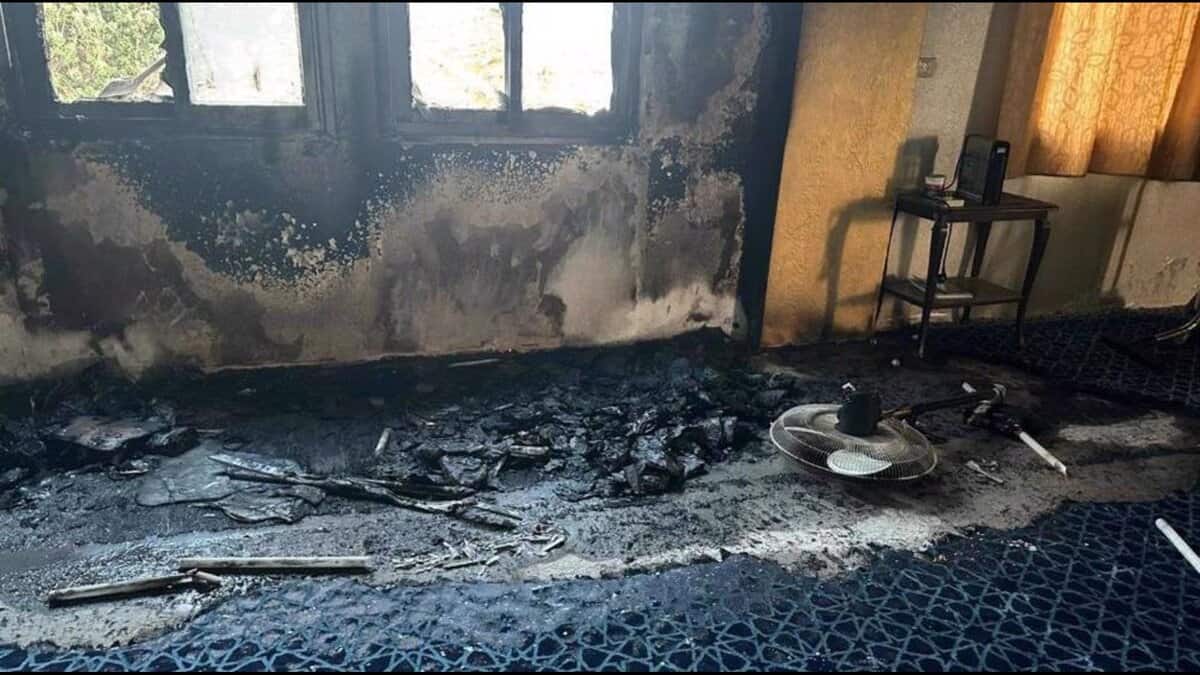
West Bank: Israeli settlers torched and defaced a mosque in a Palestinian village in the central West Bank overnight, scribbling hateful messages in a show of defiance, a day after some Israeli leaders condemned a recent attack by settlers against Palestinians.
One wall and at least three copies of the Quran and some of the carpeting at the mosque in the Palestinian town of Deir Istiya had been torched when an AP reporter visited on Thursday, November 13.
On one side of the mosque, settlers had left graffiti messages like “we are not afraid,” “we will take revenge again,” and “keep on condemning.” The Hebrew scrawl, difficult to make out, appeared to reference Maj. Gen Avi Bluth, the chief of the military’s Central Command, issued a rare denunciation of the violence on Wednesday.
It was the latest in a string of attacks that have provoked expressions of concern from top officials, military leaders and the Trump administration. Israel’s Prime Minister Benjamin Netanyahu has not commented on the surge in violence.
Soldiers from Israel’s military, which did not immediately respond to a request for comment, were present at the scene.
Speaking at a press conference on Wednesday, US Secretary of State Marco Rubio said there was “some concern about events in the West Bank spilling over and creating an effect that could undermine what we’re doing in Gaza.”
Young settlers have launched hundreds of attacks since the war in Gaza erupted two years ago. The attacks have intensified in recent weeks as Palestinians harvest their olive trees in an annual ritual. October was the month with the highest-ever number of recorded settler attacks in the West Bank since the UN’s humanitarian office began keeping track in 2006, says the office.
On Tuesday, dozens of masked Israeli settlers attacked the Palestinian villages of Beit Lid and Deir Sharaf in the West Bank, setting fire to vehicles and other property before clashing with Israeli soldiers.
President Isaac Herzog described the attacks as “shocking and serious,” adding a powerful voice to what has been muted criticism by top Israeli officials of the settler violence. Herzog’s position, while largely ceremonial, is meant to serve as a moral compass and unifying force for the country.
Herzog said the violence committed by a “handful” of perpetrators crosses a red line,” adding in a social media post that “all state authorities must act decisively to eradicate the phenomenon.”
The Israeli army’s chief of staff, Eyal Zamir, echoed Herzog’s condemnations of the West Bank violence, saying the military “will not tolerate the phenomena of a minority of criminals who tarnish a law-abiding public.”
He said the army is committed to stopping violent acts committed by settlers, which he described as contrary to Israeli values and that “divert the attention of our forces from fulfilling their mission.”
In his comments on Wednesday, Rubio commended Israel’s president and the high-ranking military officials for denouncing the Beit Lid attacks.
Palestinians and human rights workers accuse the Israeli army and police of failing to halt attacks by settlers. Israel’s government is dominated by far-right proponents of the settler movement, including Finance Minister Bezalel Smotrich, who formulates settlement policy, and Cabinet minister Itamar Ben-Gvir, who oversees the nation’s police force.




